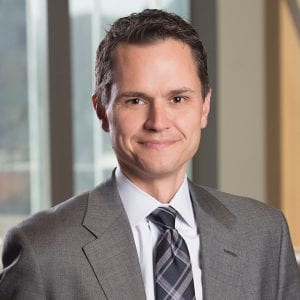
Andrew Strimaitis teaches in the Master in Science in Tax Program in the School of Accountancy & MIS.
What course do you teach in the MST program?
I currently teach tax research. I’ll be the first to acknowledge it is not the most mentally stimulating subject, but it is essential to a career as a tax lawyer or tax advisor. Because much of tax research is diving in and getting familiar with the code, the regulations, case law and different forms of guidance, I try to engage my students in practical exercises designed to illustrate how all of these things often combine to form the basis for tax advice. I do assign some tedious exercises because students just need to know where to find things, but I try to keep those to a minimum and, instead, focus on the big picture.
What do you like most about the course, and what do you hope students will learn from you?
The two things I like most are that I get to meet, and hopefully positively impact, students at or near the beginning of their MST program. Second, that I get to help students better learn a practical skill that will continue to serve them throughout their careers providing tax advice to clients. As tax professionals, we are often advising our clients on matters where, by definition, the client’s realistic possibility of success on the merits translates to a one in three chance of success – that’s quite a gray area, and research skills are essential to narrowing that gray area.
Tell us about your background.
Professionally, I am a partner at the Chicago law firm Barack Ferrazzano Kirschbaum & Nagelberg LLP, where I serve as the chair of Barack Ferrazzano’s compensation and employment practice group. I received both my undergraduate and law degrees from Loyola University Chicago, and a Master’s in Tax Law from the University of Florida.
I started my career with a short stint with Arthur Andersen LLP in Chicago. The talk at the time was that “multi-disciplinary practice” (meaning accountants and lawyers working together in harmony!) was right around the corner. While that has happened in other countries, here in the U.S. it is still not practical. So, I left AA to practice law with Baker & McKenzie LLP. I was with B&M for about eight years when an opportunity with BFKN was presented to me. I’ve been here ever since (almost 15 years).
Personally, I’m married with two teenagers, and a pandemic puppy. We live in the western suburbs (of Chicago). I grew up in Chicago’s southwest suburbs as one of five children of two Lithuanian immigrant parents. Hard work was expected, education was highly valued, and there was never a shortage of delicious Lithuanian food on the table.
What area of tax do you practice, and what are some examples of the projects you worked on?
I practice law in executive compensation and employee benefits. In addition to relevant provisions of the code and regulations, my practice regularly involves issues of securities law, contract law and ERISA (which is the law that sets fiduciary and other standards applicable to employer sponsored retirement and welfare benefit plans).
A typical day for me could see me advising a client on the design of a nonqualified deferred compensation plan or an equity incentive plan, or discussing with a client the tax issues that can arise in connection with mergers and acquisitions, or advising a client how to correct errors that may have occurred with respect to its tax-qualified retirement plan. Other days, I’ll help public company clients to prepare the executive compensation disclosures included in their annual proxy statements or might help an executive team that is negotiating its equity participation in a new company after a private equity buyout.
Because my firm represents a significant number of financial institutions, I’m also regularly advising clients with respect to bank regulatory rules that can impact their compensation plans and programs. One of the things I enjoy most about my area of practice is the great variety of issues that I am asked to help clients through.
What advice do you have for aspiring tax professionals?
In my class, I try to impart to my students the importance of working collaboratively in providing tax advice to clients. The area of tax law is so technical, so precise – it’s easy to find scenarios where three different tax advisors might have three different views based on wording of a regulation alone – so it is really important to not practice in a bubble. Hear what other people have to say on a topic and maybe learn something new along the way. The other aspect of tax law I try to stress is that it doesn’t happen in a vacuum. The world around us – global events, national events, politics, religion – they all can, and do, have an impact on tax policy and tax law. So, in order to better understand the tax laws in place, you need to understand the context in which such laws were implemented. Become a fan of history—it will help put you in the right mind set for doing tax research!
